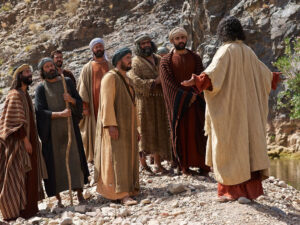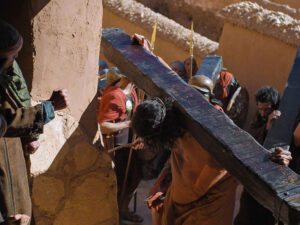It was a common practice in ancient times for a condemned prisoner to carry his own cross to the site of his execution. That’s why Jesus was made to carry the cross on which he would be crucified (John 19:17). When he became too weak from the beatings he had received to bear it any longer, a man passing by was forced to carry it the rest of the way as he followed behind Jesus (Mark 15:21).

In modern times, many men have carried crosses throughout the world. Rather than being forced, though, they chose to. For 56 years, Arthur Blessitt has carried a cross he made from wood, metal, and a wheel through 324 countries. [1] He said he does it to remind people of the great sacrifice Jesus made for us.
Though Arthur, and others, are being obedient to what God has called them to do, carrying a physical cross is not what Jesus referred to when he said, “If anyone would come after me, he must deny himself and take up his cross daily and follow me” (Luke 9:23).
We often talk of “bearing our cross.” Do you know what yours is? Those words have usually brought to my mind suffering under the weight of various afflictions, whatever might be a difficult burden for me at the moment. I’ve also considered that it may be something I personally have to live with all my life, like Paul’s thorn in the flesh that God wouldn’t remove, and I’ve tried to figure out what that might be for me so I can bear it well.
Then, I came across two small paragraphs tucked away in a book I was reading that mentioned taking up our cross. The idea they conveyed caused me to experience a small “aha” moment that sent me back to scripture to check the context.
The teaching about taking up our cross is recorded in three of the four gospels. This is the passage from Luke:
22And he [Jesus] said, “The Son of Man must suffer many things and be rejected by the elders, chief priests and teachers of the law, and he must be killed and on the third day be raised to life.” 23Then he said to them all: “If anyone would come after me, he must deny himself and take up his cross daily and follow me. 24For whoever wants to save his life will lose it, but whoever loses his life for me will save it. 25What good is it for a man to gain the whole world, and yet lose or forfeit his very self? 26If anyone is ashamed of me and my words, the Son of Man will be ashamed of him when he comes in his glory and in the glory of the Father and of the holy angels.” ~Luke 9:22-16
Taking up our cross, therefore, is connected to following Jesus. It’s about being his disciple. First he shared with his small group of disciples some hard specifics about where he was going (v.22). But it is made clear from other scriptures (Mark 8:34; Luke 14:25) that when he talked of taking up the cross, he was speaking to the large crowds traveling with him.

To understand the meaning of carrying our cross, it will help to know what it meant to be a disciple in Jesus’ day. Itinerant teachers of the scriptures, also referred to as rabbis or masters, were many. They traveled the country teaching in open public areas or homes. Sometimes they spoke to only a handful of listeners, sometimes to large crowds. A student would seek permission from a particular rabbi to travel with him and learn from him. He then spent twenty-four hours a day for the next several years working, eating, and studying with his teacher. He didn’t just learn scriptures, but also how to live them and how to become like his teacher. He imitated what his teacher did, how he spoke, how he conducted himself. A disciple understood that it was a life of hardships, but also honor, on his way to becoming a rabbi himself. [2]

Jesus was a rabbi traveling with his group of chosen disciples, but crowds followed him as well to hear his teachings. Knowing that many were interested only in his miracles, he declared to all of them what would be required of anyone serious about becoming his disciple.
Taking up our cross is about discipleship, not salvation. Carrying our cross will not save us from our sins. But after we have trusted in Jesus and become children of God, we can then become his disciples. If we do, though, Jesus says there is a condition: we have to deny ourselves and carry our cross. “If anyone would come after me, he must deny himself and take up his cross daily and follow me.”

In Jesus’ day, the understanding people had of a cross was of the physical cross beam on which convicts were crucified. It represented the most horrible form of capital punishment. It carried such shame that people did not even speak of it. Wiersbe says, “To take up the cross means to identify with Christ in His rejection, shame, suffering, and death.” [3] It is not limited to a particular problem I have today. Rather, it is the way I live my life.
If we choose to follow Jesus, our path will look much like his. Remember—the disciple imitates his teacher so he can be like him. Jesus said, “A student is not above his teacher, but everyone who is fully trained will be like his teacher” (Luke 6:40). He isn’t saying we will be physically crucified, but we will constantly die to ourselves as we choose his way over ours. We will be shamed and rejected by the world as he was. We will suffer being misunderstood as he was.
Our cross is not a burden someone else has placed on us. When Jesus tells us to take up the cross, he infers that we have to choose whether or not we are going to pick it up. He did not have to die on the cross; he chose to in obedience to his Father.
Taking up our cross is not a one-time decision. Jesus says we must take up our cross daily (Luke 9:23). His disciples didn’t sit under his instruction only when he passed through their town. They left their homes to follow him wherever he went.
And, though Jesus died only once on the cross, he made the decision every day to be obedient to everything his Father said. He prayed in the garden the night before he bore his cross for the last time: “Father, if you are willing, take this cup from me; yet not my will, but yours be done” (Luke 22:42).
Bearing our cross is the only way we can be true disciples and become like Jesus. And we do it when we give up our life for the better one he has for us (Luke 9:24), by choosing his will over our own every day.
Scripture quotations are from NIV.
[2] https://hrcak.srce.hr/file/333538
[3] Wiersbe, Warren, The Bible Exposition Commentary, New Testament: Volume 1, p.60





Brenda+Murphy
October 11, 2023How true that being a disciple is a 24/7 thing, and we daily give up our way for his. And yet, though it sounds negative, it means we walk in peace and joy and love and a relationship with him that is worth anything we could possibly have clung to. Yahoo!
bspencer
October 11, 2023Yes, it does sound negative. Our nature is so governed by selfishness. But you said it well, Brenda. If we only knew what it could be like! It reminds me of the verse: “Taste and see that the Lord is good.” (Psalm 34:8).
Jane Onspaugh
October 13, 2023Lately, I have been reading about Christians who are being persecuted around the world. I suspect they have a very different view of what it means to take up their cross daily as they must decide every day if they will deny Jesus or live in faith in Jesus and possibly die/suffer great loss… In this country, my persecution is when someone says I’m crazy to believe as I do.
As we choose to die to ourselves daily, I also have to remember how blessed I am to live in the USA, have a good house in a safe neighborhood and don’t worry about where my next meals is coming from. I have found that dying daily also means learning to love as God loves. That might mean sharing the gospel with a stranger or praying for those who call me crazy.
Thanks for sharing Bonnie!
bspencer
October 13, 2023I, too, have read much about believers in countries where they are persecuted daily for following Jesus. Sometimes it is for simply speaking His name or possessing a Bible. And yet they are so faithful, and joyful to suffer for Jesus because they know scripture says his followers will be persecuted. We are so pampered and “rich” here that we miss the real wealth that those believers possess.
Thank you for your observations, Jane. I am becoming more and more aware of my lack of true discipleship because of my gravitation to my own comfort.